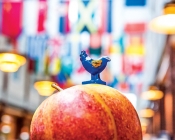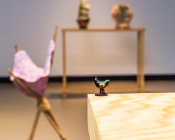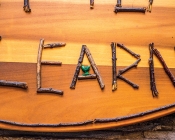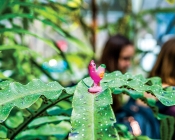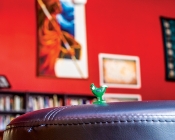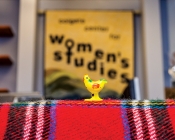All photos by Mark DiOrio
It’s hard to remember when I first started calling my creative writing students chickens. It was after I started feeling like you guys wasn’t the best collective to use for groups that were sometimes largely female, but before I caught the y’all bug during my three years in the South. Whenever it happened, I did it because I liked the idea of them as a brood, of myself as a mother hen, of us all bustling about trying to make sense of stories and the world together.
To spend a semester sharing your rough work with a collective of fellow artists in a writing workshop can be an intense bonding experience. The last day can sometimes feel a bit anticlimactic. I am a person who believes in ritual, so I wanted to find some kind of closing ritual for these classes. This led me to the plastic chickens.
The chickens are tiny plastic roosters that come in a variety of colors. They’re actually game pieces for a Dominos variation called Chicken Foot. They are not fancy or special in any way except that I have been giving them to my students for almost a decade, so there are a lot of them out there. On the last day of the workshop, as the students read from their stories, I pass a bowl of chickens around the table.
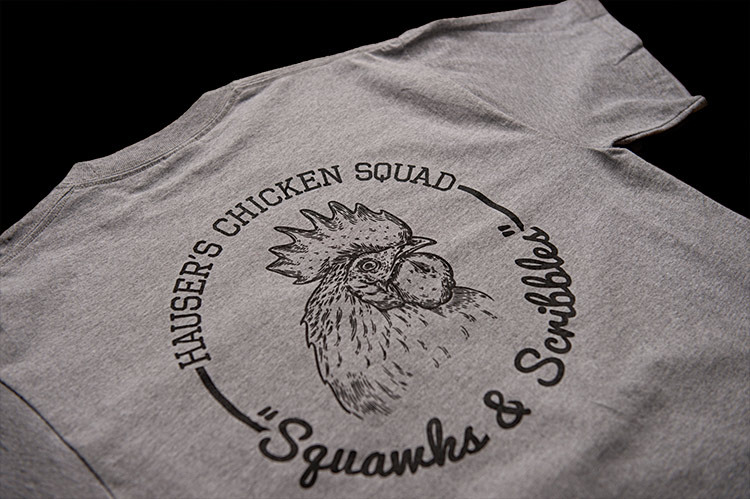
As each person picks out a chicken, here is what I tell them: People enjoy asking writers about their practice. I, too, want to see beautiful photos of my favorite memoirists’ desks or find out what kind of tea a beloved novelist consumes while in the zone. I have also read the profiles about a certain wild talent who always wakes up at 5 a.m., reads an invocation from Wordsworth aloud, swaddles themself in a special scarf while listening to a particular symphony, and then the words just come. All of this
is good if it works for the people for whom it works.
But this is not writing, and nor is any of it a prerequisite for writing. I think it’s misleading, and possibly dangerous, to imply that most or even some writers have a practice like this.
Truly, all you need to be a writer is to get your butt in a seat and write. And then to do that again. And again. In my writing group we call this sitzfleisch.
I wrote my first novel on a commuter rail. In bodegas on lunchbreak. In a weird cat pee–smelling place called the Yippie Café that offered dollar coffee and did not resent me spending my lunch break there for that fee. Sometimes I worked on the novel while at my desk job. I worked on it after the kids I nannied were asleep. This is not supposed to be an inspirational story. This is how most things you’ve read have been written: in the scraps and stolen moments of work time a writer has carved out for themself. It is the rare book you read that was written completely at one beautiful desk during the same set of perfect circumstances every day.
I want my students to know: If you are always waiting for the perfect-feeling moment to write, you will never write anything.
And this is what the chicken is for. It is a tiny flag planted in the ground to say This Is Now A Writing Space. This time is my time. I know some of my students’ chickens travel in their eyeglass cases, waiting to be deployed. I once had a student materialize a chicken from her inside jacket pocket, where it traveled with her always. Some chickens DO live on writing desks, which is a wonderful and beautiful thing as well.
And listen, here’s another thing that’s important: If you’re a person looking to make more creative space in your life, you don’t need me to give you a chicken. You can do this yourself.
Find a particularly pleasing stone on a hike. Feed a quarter into the gumball machine at the grocery store and use whatever little toy comes out. That’s the whole point of the “chicken.” You don’t need anyone’s permission or any outside anything in order to sit down and write. Good things are built slowly and through imperfect circumstances. All you need is to claim a small patch of time for yourself. And then another one, and another one.
— Professor CJ Hauser teaches creative writing and literature at Colgate. Her recent novel, Family of Origin, was published by Doubleday in July 2019. She is also the author of the novel The From-Aways, and her work has appeared in the Paris Review, Esquire, and the Guardian.

Last fall, Hauser was interviewed on Late Night with Seth Meyers as part of his author series: “Two days before my Late Night appearance, the producer told me that Seth Meyers would ask me about my writing practice and rituals. I knew I was in trouble — because the whole reason I give chickens to my students is to debunk this notion of writerly practice. I was 20 minutes out of town and stewing over whether to tell the truth or to make up some shiny-sounding answer when I turned the car around, drove back to my office in Lathrop Hall, and picked out a chicken to give Seth Meyers.”


